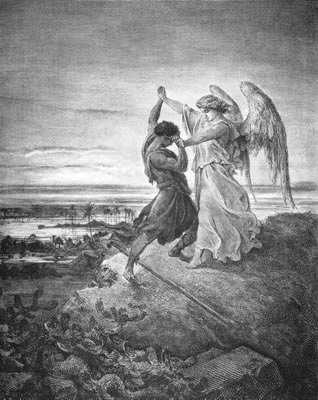
Author Keith Donohue's story gets off to a quick start -- a knock at a lonely old lady's door in the dead of a winter night, a small, threadbare child standing in the cold. The woman is Margaret Quinn, a widow who has never fully recovered from the loss of her own daughter who ran away to join a revolutionary cult -- the Angels of Destruction -- as a teenager a decade before. The strangely knowing nine-year-old is either a runaway herself, or perhaps an angel, born of the woman's prayer to have her own daughter returned. There is a bit of ambiguity introduced as to the role of the girl, who stays with Margaret to be passed off as her grandchild in an elaborate ruse. But the novel definitely favors the supernatural identity of Norah, the waif, who can perform miracles that amaze her fellow third-graders and her best friend, Sean. Another darker, more sinister presence hovers in the background, always watching, insinuating himself among Mrs. Quinn's acquaintances, asking pointed questions about the mysterious Norah Quinn.
There is one brief mention of the name Noriel, which the dark, watching presence inscribes on a snowy windshield early in the novel, suggesting a link with Norah. I did not read up on my angel lore while reading this, but according to esotericaarchives.com, Noriel is the angel of the fourth month, which doesn't really shed any light on the plot, but maybe someone else knows more about this than I do.
Whether you think Donohue pulls off the supernatural part of the story or not, the novel is really about the unambiguously human characters -- awkward, fatherless Sean, lonely Margaret, and her wayward daughter Erica. The themes are familiar ones -- forgiveness, redemption, hope, faith. A novel like this, with one foot in the invisible and supernatural, invites comparison with someone like John Crowley, and it's sure to pale in that comparison. That's not really fair, of course -- it's like comparing every novel about a dysfunctional Southern family with Faulkner or every fishing tale with Moby Dick. My excuse is that I've actually been reading Crowley concurrently. That being said, I think Donohue has written a very engaging story with some minor flaws. I enjoyed it. I wanted to see how he wound it all up in the end, and how the characters fared. Here's a short quote to give you a little flavor of the story:
She was used to moving numbly through the desolation of her life. Like the survivors of momentous devastation, she patched her sorrow and moved on to some semblance of normalcy. And now the girl had come, and Margaret sensed the cracks in her will to abide nothing but the memory of her daughter. Everything, bad as it was, had been fine, bearable. But this morning, Norah had shattered the world.
2 comments:
Wow that book sound really awesome. I just did a book order tonight but I will add this to my list of books for next week. Thanks for the review.
You're welcome. I meant to add that it had aspects that reminded me of two other good novels: A. Manette Ansay's River Angel and Russell Banks' The Darling, which concerns a woman on the run from her past with the Weather Underground.
Post a Comment